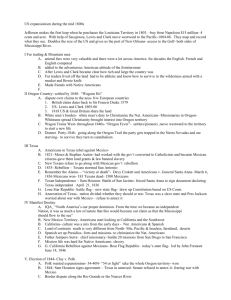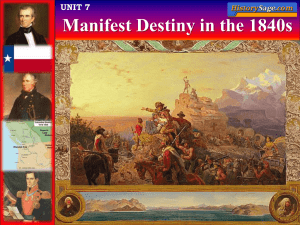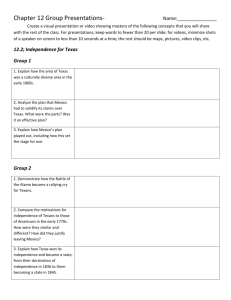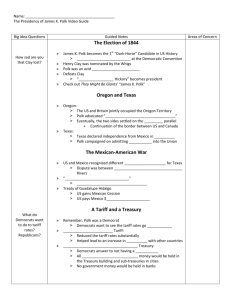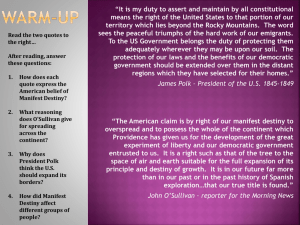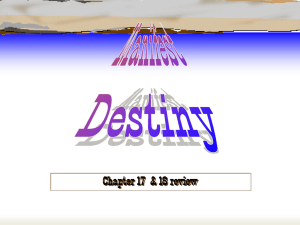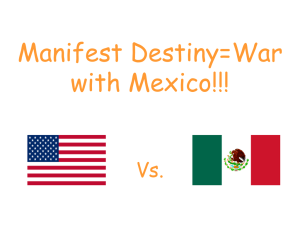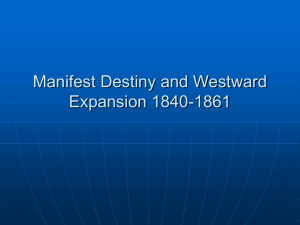CH 17
advertisement
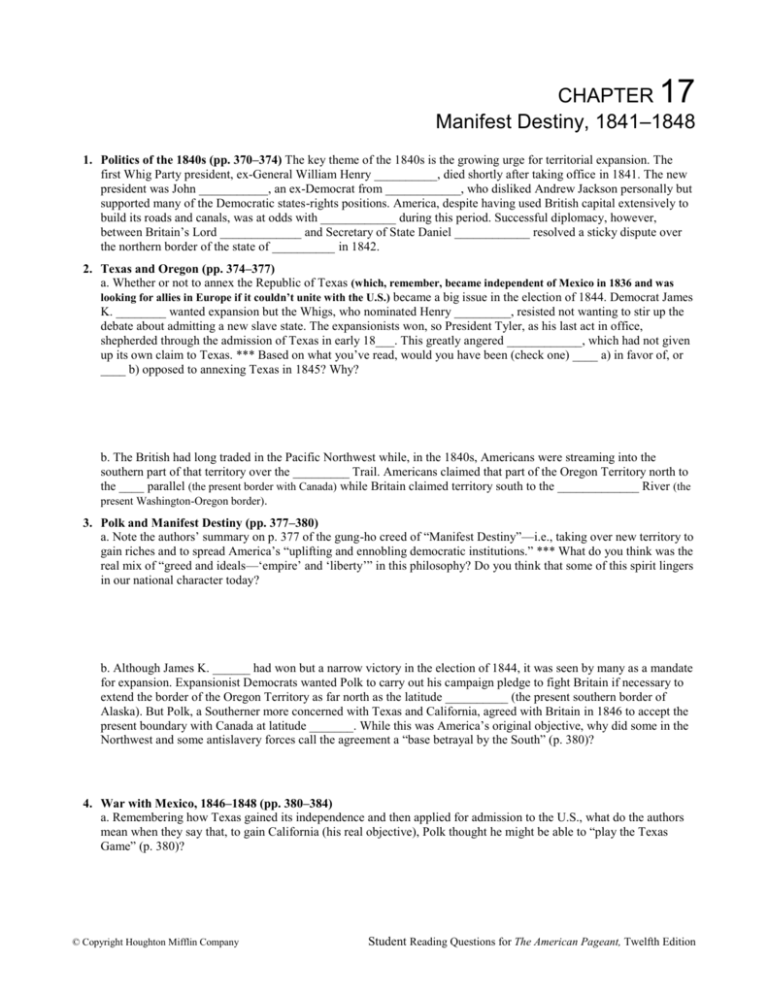
17 CHAPTER Manifest Destiny, 1841–1848 1. Politics of the 1840s (pp. 370–374) The key theme of the 1840s is the growing urge for territorial expansion. The first Whig Party president, ex-General William Henry __________, died shortly after taking office in 1841. The new president was John ___________, an ex-Democrat from ____________, who disliked Andrew Jackson personally but supported many of the Democratic states-rights positions. America, despite having used British capital extensively to build its roads and canals, was at odds with ____________ during this period. Successful diplomacy, however, between Britain’s Lord _____________ and Secretary of State Daniel ____________ resolved a sticky dispute over the northern border of the state of __________ in 1842. 2. Texas and Oregon (pp. 374–377) a. Whether or not to annex the Republic of Texas (which, remember, became independent of Mexico in 1836 and was looking for allies in Europe if it couldn’t unite with the U.S.) became a big issue in the election of 1844. Democrat James K. ________ wanted expansion but the Whigs, who nominated Henry _________, resisted not wanting to stir up the debate about admitting a new slave state. The expansionists won, so President Tyler, as his last act in office, shepherded through the admission of Texas in early 18___. This greatly angered ____________, which had not given up its own claim to Texas. *** Based on what you’ve read, would you have been (check one) ____ a) in favor of, or ____ b) opposed to annexing Texas in 1845? Why? b. The British had long traded in the Pacific Northwest while, in the 1840s, Americans were streaming into the southern part of that territory over the _________ Trail. Americans claimed that part of the Oregon Territory north to the ____ parallel (the present border with Canada) while Britain claimed territory south to the _____________ River (the present Washington-Oregon border). 3. Polk and Manifest Destiny (pp. 377–380) a. Note the authors’ summary on p. 377 of the gung-ho creed of “Manifest Destiny”—i.e., taking over new territory to gain riches and to spread America’s “uplifting and ennobling democratic institutions.” *** What do you think was the real mix of “greed and ideals—‘empire’ and ‘liberty’” in this philosophy? Do you think that some of this spirit lingers in our national character today? b. Although James K. ______ had won but a narrow victory in the election of 1844, it was seen by many as a mandate for expansion. Expansionist Democrats wanted Polk to carry out his campaign pledge to fight Britain if necessary to extend the border of the Oregon Territory as far north as the latitude __________ (the present southern border of Alaska). But Polk, a Southerner more concerned with Texas and California, agreed with Britain in 1846 to accept the present boundary with Canada at latitude _______. While this was America’s original objective, why did some in the Northwest and some antislavery forces call the agreement a “base betrayal by the South” (p. 380)? 4. War with Mexico, 1846–1848 (pp. 380–384) a. Remembering how Texas gained its independence and then applied for admission to the U.S., what do the authors mean when they say that, to gain California (his real objective), Polk thought he might be able to “play the Texas Game” (p. 380)? © Copyright Houghton Mifflin Company Student Reading Questions for The American Pageant, Twelfth Edition b. *** After reading about the Texas boundary dispute, the aborted mission of John __________ to try to buy California from Mexico, the military mission of General Zachary __________ to the disputed area between the Rio Grande River and the ___________ (means “nuts” in Spanish!) River; and Polk’s war message to Congress, what is your response to the question posed by the authors on p. 383: Did Polk provoke war with Mexico? Explain. c. During the ensuing war with Mexico (which was led by Gen. Santa ________), U.S. General Stephen W. __________ and Captain John C. ______________ helped secure California, General Zachery ___________ won a big battle in Northern Mexico at __________ __________ in early 1847, and the main force under General Winfield __________ landed at Vera Cruz and successfully captured the Mexican capital of ___________ ________ in late 1847. 5. Consequences of the Mexican War (pp. 384–388) a. The 1848 Treaty of Guadalupe ____________ ending the Mexican War was negotiated for the U.S. by Nicholas P. _______. The treaty confirmed American title to __________ and turned over to the U.S. all territory to the west, including the coveted _____________, in return for the payment to Mexico of $____________. *** What do you think of this outcome? If the U.S. won the war, why pay Mexico anything? If American troops had captured the Mexican capital, why do you think the U.S. didn’t press to annex all of Mexico? b. What impact do the authors say (pp. 385–388) the Mexican War had on each of the following? (1) American lives lost: (2) American military preparedness: (3) Latin American relations: c. What was the Wilmot Proviso and what was its significance? Why (although it was never adopted) does the proviso illustrate the fact that the war “re-aroused the snarling dog of the slavery issue”? (1) Proviso: (2) Significance: © Copyright Houghton Mifflin Company Student Reading Questions for The American Pageant, Twelfth Edition CHAPTER 17 TERM SHEET Manifest Destiny Pages 370-374 William Henry Harrison (1841) Daniel Webster Henry Clay John Tyler (1841) Canadian insurrection (1837) Caroline incident (1837) Webster-Ashburton Treaty (1842) Pages 374–377 Texas Republic James K. Polk (1844) Admission of Texas (1845) Oregon Country Hudson’s Bay Company Oregon Trail (1840s) Pages 377–380 “Manifest Destiny” 1844 election 54 40'Pledge Oregon settlement (1846) Pages 380–384 California, 1845 Texas border dispute John Slidell mission (1845) Gen. Zachary Taylor Nueces River (1846) Polk war message (1846) Gen. Santa Anna © Copyright Houghton Mifflin Company Student Reading Questions for The American Pageant, Twelfth Edition Gen. Stephen W. Kearny Capt. John C. Fremont Bear Flag Republic Battle of Buena Vista (1847) Gen. Winfield Scott Vera Cruz/Mexico City (1847) Pages 384–388 Nicholas P. Trist Treaty of Guadalupe Hidalgo (1848) “Californios” Father Junipero Serra Wilmot Proviso (1846) © Copyright Houghton Mifflin Company Student Reading Questions for The American Pageant, Twelfth Edition
